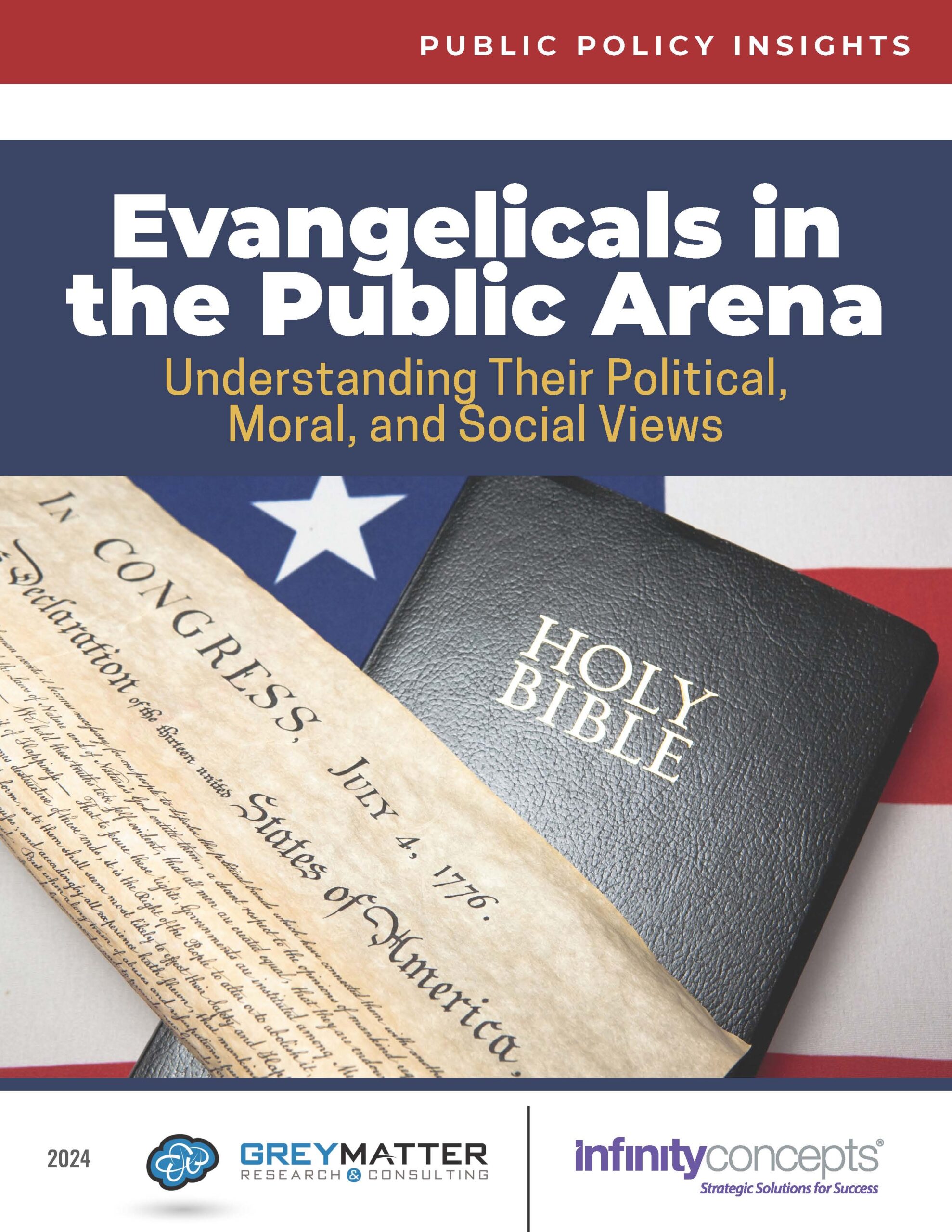Not All in One Accord
If you listen to some news reports and commentators, evangelicals in the public arena are an army of the radical faithful, intent on allowing a militant Church to control all government policy.
The reality is that evangelical Protestants are far more diverse politically and socially than is often portrayed. Our new report Evangelicals in the Public Arena: Understanding Their Political, Moral, and Social Views digs into what this group of Americans really believes about many of today’s most controversial issues.

Yes, There Are Evangelical Liberals
First, it’s important to understand that “evangelical” and “right wing” are not synonyms. Yes, evangelicals are far more likely to be politically conservative than are Americans in general. But 12% of evangelical Protestants identify as liberal politically, while another 24% say they are right in the middle between conservative and liberal. Sixty-three percent are conservative. But even among conservatives, 24% identify as very conservative, 25% as conservative, and 14% as only somewhat conservative.
Second, there apparently is a lack of understanding about what it means to be evangelical but not politically conservative. Liberal Americans are commonly identified with being pro-choice, pro-gay-rights, less constrained on sexuality, etc. Yet a clear majority of politically liberal evangelicals consider abortion (62%), sex before marriage (70%), homosexual activity or sex (70%), and pornography (80%) to be sin.
Learn all the details in our new report Evangelicals in the Public Arena: Understanding Their Political, Moral, and Social Views, from Grey Matter Research and Infinity Concepts. It’s a study of 1,039 evangelical Protestant adults. (For a free copy of Evangelicals in the Public Arena, simply e-mail ron@greymatterresearch.com.)
Demonizing the “Other Side”
Evangelicals are found on both “sides” (liberal and conservative), as well as in the middle. Even so, both sides tend to look askance at those with very different political beliefs. Conservative evangelicals, especially, frequently see very liberal Americans as misguided (50%), uninformed (36%), anti-Christian (32%), radical (26%), immoral (25%), and anti-American (23%).
Liberal evangelicals in general are less likely to see very conservative Americans in these terms, but often still have negative views of the very conservative. One thing is true for both sides: the more liberal or conservative evangelicals are, the more negative are their views of the other side.
Church/Church Leader Involvement
One mistake many researchers make is attempting to define people’s beliefs on highly complex issues with simple questions. They ask, “Do you believe abortion should be legal?” or “Do you support stricter gun laws?” But these are simplistic questions about extremely complicated issues. Most Americans are not 100% on one “side” or the other on these issues. For instance, someone may support the right to bear arms, but believe certain types of people should not have those rights. Or they may oppose abortion, except in cases of rape or when the mother’s life is in danger.
Therefore, we examined these issues:
- Gun laws/2nd Amendment
- Free speech/Censorship/1st Amendment
- Racism/racial justice
- Antisemitism
- Transgender issues
- Abortion issues
- Election integrity/fairness
- Parental rights in public school decisions about individual children
- Donor privacy
- What is acceptable in public expressions of religious faith
- Criminal justice issues/sentencing guidelines
But instead of exploring what evangelicals believe on each issue (which easily could require 11 full studies for a nuanced understanding), we looked at two questions:
- Do evangelicals see each one of these largely a religious, social, or political issue?
- How much involvement do evangelicals believe churches and church leaders should have publicly on discussions and decisions regarding each issue?
While you will find all the details in our report, we’ll reveal three things here.
Three Key Things
First, a majority of evangelicals view only one of these 11 issues (public expressions of religious faith) as mostly a religious issue. They much more commonly see the others as either social or political issues.
Second, evangelicals are quite divided on how publicly involved churches/church leaders should be on each issue. Only 11% want to see churches very involved publicly in all 11 of these issues. Conversely, just 22% feel churches should not be very involved in any of these issues. Abortion (54%) and what is acceptable in public expressions of religious faith (51%) are the only two issues on which a majority of evangelicals (and a very slim majority at that) want churches and church leaders to be very involved publicly.
Evangelicals are least likely to say churches/church leaders should be very involved in election integrity/fairness (34%), criminal justice/sentencing reform (32%), donor privacy (32%), and gun legislation/2nd Amendment rights (30%).
Third, when evangelicals see each of these 11 as religious issues, rather than largely political or social, they are substantially more likely to want churches/church leaders very involved publicly.
Find much more detail and nuance in the full report. Evangelicals in the Public Arena is free by request – just e-mail ron@greymatterresearch.com.
How Can We Help You?
When you request the report, feel free to start a conversation about how Grey Matter Research can help you. Grey Matter has helped scores of organizations understand their current constituents and their target market. This includes a wide variety of donor-supported organizations (faith-based and non-faith-based), denominations and individual churches, marketing/advertising/fundraising agencies, and for-profit companies.
We’ve helped develop Bible study materials, learned why donors stop supporting certain ministries, explored how pastors handle their finances, and dozens of other important topics.
So, how can we help you?
We have A Passion for Research That Makes a Difference. Talk to us about how we can make a difference for you.
